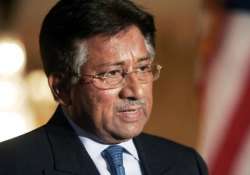Pak To Seek Interpol Red Corner Notice Against Musharraf
Karachi/Islamabad, Feb 21: Pakistan will seek Interpol help to bring back Pervez Musharraf to face trial over ex-Premier Benazir Bhutto's assassination, Interior Minister Rehman Malik said today, a month after the former military ruler deferred

Karachi/Islamabad, Feb 21: Pakistan will seek Interpol help to bring back Pervez Musharraf to face trial over ex-Premier Benazir Bhutto's assassination, Interior Minister Rehman Malik said today, a month after the former military ruler deferred indefinitely plans to return home to contest polls.
68-year-old Musharraf has been accused of failing to provide adequate security to Bhutto, who was murdered in 2007 during his tenure.
“The court has already declared him (Musharraf) a proclaimed offender and now the government is moving for a Red (Corner) Notice. We will get him through the Interpol to Pakistan to face trial,” Malik said during a special briefing for members of the assembly of southern Sindh province in Karachi.
The briefing by Malik and senior police and Federal Investigation Agency (FIA) officials was aired live by TV news channels.
Malik said several attempts to serve notices issued by an anti-terrorism court to Musharraf through the Pakistan High Commission in Britain were unsuccessful.
Musharraf, who has been living in self-exile in London and Dubai since he resigned in 2008, last month deferred indefinitely his plans to return to Pakistan to stage a political comeback, citing security reasons.
Khalid Qureshi, the officer heading the investigation into Bhutto's assassination by a suicide bomber in Rawalpindi on December 27, 2007, said Musharraf was named in the chargesheet as he had failed to provide the “VVIP security” that Bhutto was entitled to as a two-time former Premier.
Security was “deliberately denied by the then government” to Bhutto even though two other former premiers - Shaukat Aziz and Chaudhry Shujaat Hussain - were given protection, Qureshi said.
Musharraf had failed to “provide adequate security commensurate to the threat” though his government knew that Bhutto was under “tremendous threat” from militants, and this made him “even more culpable and very difficult to defend,” he said.
Besides, Bhutto's aide Mark Siegel had testified that he was a witness to a “threatening” and “abusive” phone call made by Musharraf to Bhutto before her return to Pakistan in 2007, he added.
The investigating officials and prosecutors said Bhutto may not have been targeted by the suicide attacker and his companions if adequate security had been provided to her.
Qureshi said after the suicide attacker detonated his explosive vest, there was a “disruption of the police security command” and there were no plans to evacuate her or to take her to a hospital in the event of an attack.
“There was absolute chaos after the suicide attack on her vehicle,” Qureshi said.
The officers further said two top police officials - Saud Aziz and Khurram Shahzad - were responsible for lapses such as destroying evidence by hosing down the crime scene within hours of the suicide attack.
The briefing by Malik and the officers marked the first time that senior representatives of the federal government have spoken in public about the assassination, but they offered little information that was not already known.
Malik and the officers said slain Tehrik-e-Taliban Pakistan chief Baitullah Mehsud was the alleged mastermind behind the assassination and that the plan for the suicide attack was finalised at Madrassa Haqqani, a Deobandi seminary in Khyber-Paktunkhwa province with long links to militants.
Investigators have so far arrested five suspects, most of them members of militant groups linked to the Taliban, and police officers Saud Aziz and Khurram Shahzad, in connection with the assassination.
Their trial is being conducted by a Rawalpindi-based anti-terrorism court.
Qureshi said 13 prosecution witnesses had testified so far and that he was hopeful the trial would be completed in two months.
Malik and Qureshi said several key suspects had been killed in operations by Pakistani security forces or US drone strikes.
Some of the suspects were also involved in kidnapping people for ransom to raise funds for terrorist activities.
The suicide attacker's links to the other conspirators was established when the FBI conducted DNA tests of the bomber's body parts and his shawl, cap and shoes found in the home in Rawalpindi of another suspect, Malik said.
Pakistan asked the FBI to do the DNA tests as it did not have the capability, he added.
The suspects were traced after main accused Hasnain Gul mistakenly called the landline phone at his home in Rawalpindi.
“All terrorists have strict instructions of not calling any landline number,” Qureshi said.